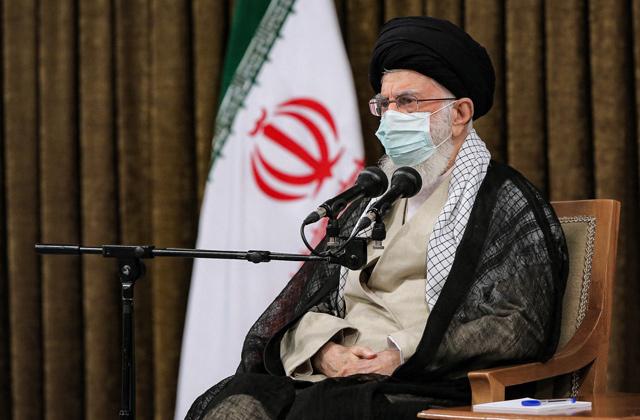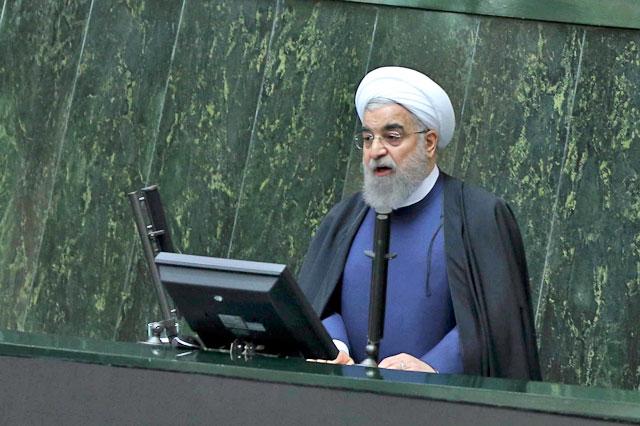You are here
Iran says US breaching nuclear deal as Rouhani starts new term
By AFP - Aug 03,2017 - Last updated at Aug 03,2017
TEHRAN — Iran said Thursday that new US sanctions were a violation of its nuclear deal with world powers, piling pressure on President Hassan Rouhani as he starts his second term.
Rouhani vowed to keep up his efforts to end Iran’s isolation as he was sworn in by the Islamic republic’s Supreme Leader Ayatollah Ali Khamenei following his reelection in May.
But the ceremony came less than 24 hours after US President Donald Trump confirmed fresh sanctions against Iran.
Tehran says the new measures violate its 2015 deal with world powers that eased sanctions in exchange for curbs on its nuclear programme, an agreement which Trump has repeatedly threatened to tear up.
“We believe that the nuclear deal has been violated and we will react appropriately,” Deputy Foreign Minister Abbas Araghchi said on state television.
“We will certainly not fall into the trap of US policy and Trump, and our reaction will be very carefully considered.”
The mounting crisis creates a difficult situation for Rouhani, a 68-year-old moderate who won a second four-year term largely thanks to his efforts to repair relations with the West.
“We will never accept isolation,” Rouhani said as he was sworn in front of top political and military officials.
“The nuclear deal is a sign of Iran’s goodwill on the international stage.”
Khamenei took a tougher line, saying Iran must not fall for Washington’s “tricks”.
“The enemy’s hostility has made us more resistant,” the supreme leader said.
Iranian officials say they have prepared a 16-point document for how they will respond to the new sanctions, without giving details.
The new parliament will also vote on a bill boosting financial support to the Revolutionary Guards and the country’s missile programme, which are targeted by the sanctions.
‘Unfortunate timing’
For Rouhani, who had hoped his second term would focus on rebuilding the stagnant economy, “it’s unfortunate timing”, said Ellie Geranmayeh, an Iran analyst with the European Council on Foreign Relations.
“What will be absolutely critical is how the Europeans position themselves,” she said.
Britain, France and Germany — who signed the deal alongside Russia, China and the United States — remain firm backers of the agreement and are eagerly seeking to rebuild trade ties with Iran despite logistical problems caused by US sanctions.
French energy giant Total defied US pressure in July by signing a multi-billion-dollar gas deal with Iran.
“What Iranians are banking on at the moment, maybe overestimating, is that Europe will safeguard and build on the deal, and make it too politically costly for Trump to tear it up, or at least show Washington that if it walks away, it will be doing so alone,” said Geranmayeh.
But the Europeans do oppose Iran’s recent missile tests, with the French foreign ministry stating Thursday that they “contradict” UN Resolution 2231 which oversees the nuclear deal, and “constitute a potential threat to stability and security in the region”.
They have been careful to avoid claims that Iran is “violating” any agreements, since the UN resolution only “urged” Iran to refrain from missile tests.
Everyone agrees that Iran has stuck to its central commitments regarding its nuclear programme — including, reluctantly, the Trump administration.
But with Iran gaining the upper hand across the Middle East, through support for proxies in Syria, Lebanon and Iraq, US lawmakers appear determined to ratchet up tensions.
Meanwhile, Rouhani also faces challenges at home.
Since the election, he has engaged in a war of words with the Revolutionary Guards over their outsized role in the economy — although they have since sought to bury the hatchet with a public show of unity.
Meanwhile, reformist allies are angry over news that he will unveil another all-male cabinet.
Much of Rouhani’s popularity has been built on his promise of greater civil liberties, including more rights for women, but Iran has still had only one female cabinet member since the 1979 revolution — ironically under hardliner Mahmoud Ahmadinejad.
Related Articles
TEHRAN — Iran’s supreme leader Ayatollah Ali Khamenei said on Wednesday that experience has shown “trusting the West does not work”, as the
DUBAI — Iranian President Hassan Rouhani demanded on Sunday that Barack Obama block an extension of sanctions passed by the US Congress, say
TEHRAN — President Hassan Rouhani said Thursday Iran’s military power was “purely defensive”, after tensions with the United States over its

















